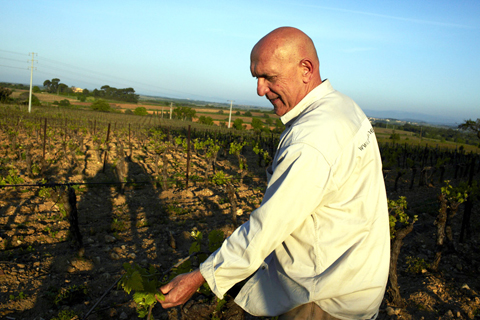Paul Jeune started working in his father’s vineyard at the age of 14 and has traced his family’s winemaking history back to an ancestor born in 1775. But he says his way of life is under threat from plans to legalize in France the winemaking methods pioneered in the US and Australia.
Jeune, along with most French winemakers, opposes EU plans to relax strict rules governing the making of rose, or blush, wines just as they are starting to gain respect — and sales.
Currently, red grapes are usually crushed and left to ferment briefly with the skins, the two being separated before the juice colors fully to produce blush wines. The EU proposal would allow Europeans to simply blend red and white wine together to create a pink blend — a less complex method used by New World producers.

PHOTO: NY TIMES NEWS SERVICE
“If you do this, why not allow people to make wine without any grapes at all?” Jeune asks, growing steadily more voluble over a glass of his own rose, from grapes grown in Provence. “You could do it in a laboratory, with alcohol, water, artificial flavors.”
Only some of the rose wine made outside France is blended; many New World winemakers employ the traditional method, using only red grapes. Some wineries use both methods.
But clearly the dispute has touched a nerve here, bringing accusations that the planned EU change will vulgarize rosi and undermine its blossoming reputation.
“We are trying to save a certain style of winemaking and they make more problems; they denigrate our profession,” Jeune said, as the sun set over the scenic vineyard of a fellow winemaker near Beziers, in the southern region of Languedoc. “It’s a scandal.”
Vintners also see the move as another measure that will allow traditional winemakers to be squeezed out by beverage multinationals. And the controversy has touched off a debate over whether New World winemakers are saving rosi or wrecking it.
The European Commission argues its changes make sense.
“There has been a lot of ooh-la-la-ing about this without too much regard for the facts,” said Michael Mann, its spokesman.
One compromise would allow France to label “traditional rose” to set it apart, though New World exporters would not be forced to identify blended wine.
In Languedoc, Anne Sutra de Germa, who runs a small winery, Domaine Monplezy, and also opposes change, is optimistic.
“In some ways it’s good to have stupid laws,” she said. “Because the consumer who wants good wine will eventually find us.”

WAITING GAME: The US has so far only offered a ‘best rate tariff,’ which officials assume is about 15 percent, the same as Japan, a person familiar with the matter said Taiwan and the US have completed “technical consultations” regarding tariffs and a finalized rate is expected to be released soon, Executive Yuan spokeswoman Michelle Lee (李慧芝) told a news conference yesterday, as a 90-day pause on US President Donald Trump’s “reciprocal” tariffs is set to expire today. The two countries have reached a “certain degree of consensus” on issues such as tariffs, nontariff trade barriers, trade facilitation, supply chain resilience and economic security, Lee said. They also discussed opportunities for cooperation, investment and procurement, she said. A joint statement is still being negotiated and would be released once the US government has made

Authorities have detained three former Taiwan Semiconductor Manufacturing Co (TMSC, 台積電) employees on suspicion of compromising classified technology used in making 2-nanometer chips, the Taiwan High Prosecutors’ Office said yesterday. Prosecutors are holding a former TSMC engineer surnamed Chen (陳) and two recently sacked TSMC engineers, including one person surnamed Wu (吳) in detention with restricted communication, following an investigation launched on July 25, a statement said. The announcement came a day after Nikkei Asia reported on the technology theft in an exclusive story, saying TSMC had fired two workers for contravening data rules on advanced chipmaking technology. Two-nanometer wafers are the most

NEW GEAR: On top of the new Tien Kung IV air defense missiles, the military is expected to place orders for a new combat vehicle next year for delivery in 2028 Mass production of Tien Kung IV (Sky Bow IV) missiles is expected to start next year, with plans to order 122 pods, the Ministry of National Defense’s (MND) latest list of regulated military material showed. The document said that the armed forces would obtain 46 pods of the air defense missiles next year and 76 pods the year after that. The Tien Kung IV is designed to intercept cruise missiles and ballistic missiles to an altitude of 70km, compared with the 60km maximum altitude achieved by the Missile Segment Enhancement variant of PAC-3 systems. A defense source said yesterday that the number of

Taiwanese exports to the US are to be subject to a 20 percent tariff starting on Thursday next week, according to an executive order signed by US President Donald Trump yesterday. The 20 percent levy was the same as the tariffs imposed on Vietnam, Sri Lanka and Bangladesh by Trump. It was higher than the tariffs imposed on Japan, South Korea and the EU (15 percent), as well as those on the Philippines (19 percent). A Taiwan official with knowledge of the matter said it is a "phased" tariff rate, and negotiations would continue. "Once negotiations conclude, Taiwan will obtain a better